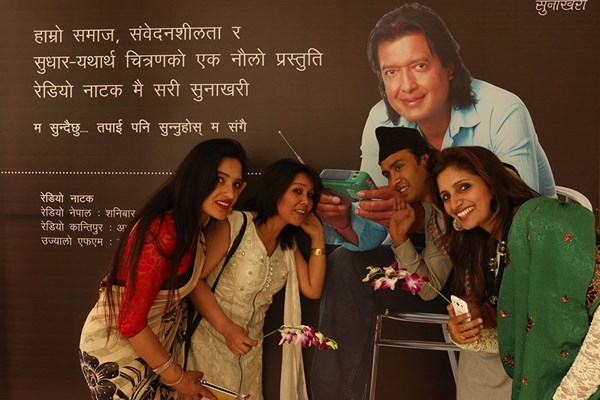SOUTH BURLINGTON, Vt., June 2, 2016 (GLOBE NEWSWIRE) -- With the film crew in the midst of an action scene, the martial arts superstar being filmed says "cut!" Usually, the director makes this call, but this is a unique case. Rajesh Hamal, a Nepali actor with so much notoriety people often call him "Maha-Nayak" which means "Great Actor," needs to listen to his favorite radio drama and the rest of the actors and production crew join him.
This is the promotional spot that has run on national and local TVs throughout Nepal for the past month as scores of people have started to tune in to what Hamal calls his favorite show. The radio show is Mai Sari Sunakhari ("Orchid, Like Me"). It launched in April and will run for two years (208 episodes) in the Nepali language. It's produced by Population Media Center (PMC) a nonprofit that uses entertainment to address health and human rights globally.Mai Sari Sunakhari addresses numerous issues, including early marriage, girls' education, gender equity, and others.
"Rajesh Hamal is the most popular superstar of the country," says Rajan Parajuli, PMC's Country Representative in Nepal. "Because of his extraordinary performance in Nepali cinema over the past two decades and his very non-controversial image, he has become the icon for all age groups. He has never done promotion for any radio show before."
This sounds like a stroke of luck to get Nepal's superstar to promote your radio drama, but the relationship is based on a lot more than luck – it's based on a shared desire to improve people's lives. Hamal is the ambassador for the National Campaign of the Ministry of Women, Children and Social Welfare in Nepal. He publicly strongly supports ending child marriage and gender-based violence.
"When we spoke to him about being involved," says Parajuli, "he said he always wanted to contribute somehow to positive change in the country, especially in the lives of remote families. He liked the themes we are addressing, was impressed with our use of entertainment, and the way we measure results."
PMC uses a particular approach to create social change: entertainment. PMC produces long-running dramas for radio, TV, and the web that engage audiences with authentic characters and culturally appropriate challenges and opportunities. People are drawn in by the characters and stories as the plot unfolds over many episodes, and learn from role models in the story. Some characters are positive, some are negative, and some are transitional – navigating in between good and bad and trying to find their way.
This approach to entertainment and social change is an approach that PMC has used to help more than 500 million people live healthier lives in more than 50 countries and it seems to already be having an impact on listeners in Nepal who are personally thanking Hamal for bringing the drama to the airwaves, demonstrating the success of the program's marketing and Hamal's role as spokesperson.
"I really find this drama very real. I was always a big fan of Rajesh and now I am so happy that he brought this drama for us," said Bakhat Hamal from Dailekh, which is in the Midwestern high hill district.
"Hamal is generally not involved in commercial promotion," says Parajuli. "He is always taken as one of the few intellectual celebrities of the country. The people of Nepal believe his words."
And those words couldn't be used for a better cause. Parajuli and PMC hope Mai Sari Sunakhari succeeds in entertaining people and in improving lives. PMC is simultaneously broadcasting another drama, Hilkor ("Ripples in the Water") for one year (104 episodes) in the local Maithili language. Both dramas are certainly off to a great start and have high hopes for the changes to come in the next two years.
ABOUT POPULATION MEDIA CENTER (PMC):
Population Media Center is a nonprofit, international development organization, which strives to improve the health and well-being of people around the world through the use of entertainment-education, specifically using serialized dramas on radio and television in which characters evolve into role models for the audience for positive behavior change. Founded in 1998, PMC has years of field experience implementing its specific method of behavior change communications, impacting more than 50 countries around the world. www.populationmedia.org
A photo accompanying this release is available at: http://www.globenewswire.com/newsroom/prs/?pkgid=40467
